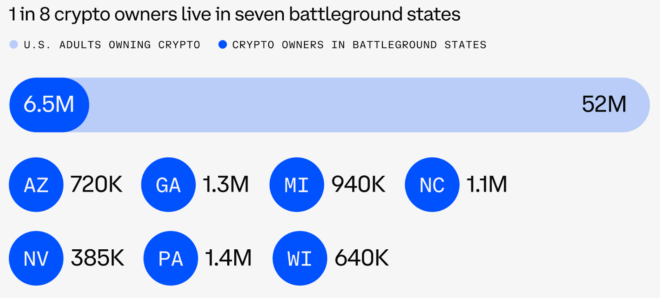A new survey shows that over half of American voters (56%) are more likely to support a presidential candidate informed about cryptocurrency.
The survey, conducted by Harris Poll (funded by Grayscale), gathered insights from over 1,800 likely voters and found that 40% of voters now pay attention to candidates’ positions on Bitcoin (BTC) and other crypto assets, compared to just 34% in December 2023.
The survey found that crypto remains a nonpartisan issue, with 45% of crypto owners viewing the Democratic Party as more favorable toward crypto and 42% favoring the Republican Party.
The report also highlights a surge in crypto interest among voters, partially attributed to the launch of spot Bitcoin and Ethereum (ETH) ETFs in the U.S.
As of September 2024, nearly a third of voters (30%) stated that these ETFs have increased their interest in crypto investing, and nearly half (46%) expect to include crypto in their future investment portfolios, up from 40% in 2023, according to the poll.
The findings touched on a growing interest in crypto among Hispanic and Black voters, with 63% and 68% expressing interest in Bitcoin, compared to only 35% of White voters. As the 2024 election approaches, candidates’ knowledge of crypto could be a defining factor for many voters.
Coinbase’s survey on crypto voters
Recent survey findings commissioned by Coinbase and conducted by Morning Consult show that the crypto community’s political preferences are more diverse than commonly perceived.
According to the poll released Sept. 30, crypto voters are evenly split in the 2024 presidential race, with 47% supporting Democratic nominee Vice President Kamala Harris and another 47% backing Republican candidate Donald Trump.
This data challenges the widespread notion that crypto owners predominantly lean Republican or Libertarian. Despite Trump’s enthusiastic reception at this year’s Bitcoin Conference and his vocal online support within the crypto space, the report suggests a more bipartisan landscape among crypto enthusiasts.
Coinbase emphasized that crypto voters are a key demographic in the upcoming election, countering media narratives that suggest a heavy Republican tilt.
The report stated that many crypto owners live in swing states, with an estimated 6.5 million crypto owners residing in seven battleground states, exceeding the vote differential in these states by more than 16 times during the 2020 election.
This concentration positions the crypto community as a crucial swing block that could influence the election outcome. Both campaigns seem to be aware of the crypto vote. Trump has softened his once-critical stance on Bitcoin, while Harris has emphasized the need for U.S. leadership in blockchain and emerging technologies.



